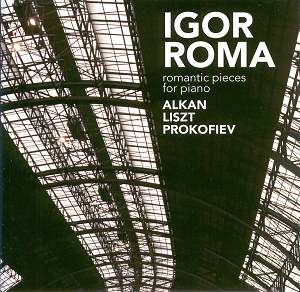The booklet contains
no information on the artist, but he
does have a website, from which I was
able to glean that he was born in 1969,
a Swiss-born Italian, who pursued studies
at Vicenza Conservatory. He was the
winner of the Franz Liszt competition
in Utrecht in 1996. This appears to
be his first disc, in spite of winning
awards for over ten years now.
Regarding the music, we have great riches here
- beginning
with the not-oft-recorded Le Festin
d'Esope. The story behind the name
of this Alkan piece is quite enjoyable.
Aesop, a servant, is told to make a
feast for his master. Aesop does so,
with each of the dishes on both nights
being variations based on one meat:
ox tongue. The piece mirrors that banquet
in being written as 24 variations on
a theme. The language of animals shows
up from time to time in the piece to
further the Aesop analogy: a lion, a
dog, and so forth. This piece was first
recorded by Raymond Lewenthal and then,
to my knowledge once afterwards by the
venerable Marc-André Hamelin
on Hyperion (CDA66794). The Lewenthal
has been released on CD in a set on
Elan records six years ago, but I'e
not been able to listen to compare [see
footnote]. What we have here with the
Roma performance of the Alkan is first-rate
playing and recording quality. The tempi
are similar (9:08 compared to Hamelin's
8:40), and the performances of both
are formidable in their own right. I
must say I rather prefer this performance
over Hamelin's. It has more snap and
I prefer Roma's voicing of the chords.
Roma simply does an amazing job. Even
for those who may prefer Hamelin, they
no doubt will agree that it is good
to see additional performances of this
work.
Regarding the Liszt,
the award mentioned above, as well as
the recording here, shows that he is
no slouch in the Liszt department. The
Gondoliera of the Années
de pélerinage is charmingly,
effortlessly played. The Canzone
is a piece of tension, setting the air
of expectation leading into the Tarantella;
the rendition is distinct, with the
lyrical episode in the middle meltingly
played. For my preferred performance
of the Transcendental etudes, I turn
to Jorge Bolet, with whose version I
am most familiar. Much time has passed
between that recording and this one,
and with Roma the sound naturally is
more immediate and intimate. Roma's
interpretation is more forceful, with
more of a sense of attack in the building
passages that fall away back into the
nocturnal quiet of the piece. In these
moments, I still prefer Bolet, who to
these ears better maintains a sense
of the languid evening harmonies that
are referred to in this specific etude's
title. Still, though, this is beautifully
played.
And now to the Prokofiev. My favourite
interpreter here is Yekaterina Ervy-Novitskaya - to be sure a bit off
the beaten path, but her angularity
and willingness to dive into the aggressiveness
of Prokofiev's music provided a wonderful
surprise finish to the 20-volume Russian
Piano School set released by BMG-Melodiya
back in 1996. In comparison, Roma's
approach here is softer from the beginning,
not as staccato, but well-defined and
with muscle. Roma betters Ervy-Novitskaya
in the quieter, more lyrical moments,
for example in Romeo and Juliet before
Parting and the Young Juliet
sections of the suite. His softer edge
to the music adds to the wistfulness
of the lyrical passage that forms the
centre of Young Juliet, and the
more tragic closing thirty seconds.
Well-played and well
recorded. I recommend this disc overall,
and especially for the wonderful performance
of the Alkan pieces, which truly dazzle.
To these ears, this first disc has been
too long in coming, and I hope that
subsequent discs will not be so long
in making an appearance.
David Blomenberg
Footnote
The Lewenthal was actually
reissued by BMG-RCA in a series called
High Performance in 1999, an Alkan disc
also including the Barcarolle, Quasi-Faust
and Symphonie, with Liszt's Hexameron
as encore - all stunningly played.
Martin Walker


